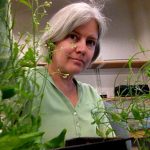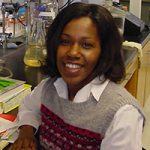GENETICS and G3 are excited to welcome new editors!
- GENETICS and G3 Series Editor: Lauren McIntyre
- GENETICS Associate Editors: Anne Britt, Elizabeth Hauser, Jennifer Surtees, Paul Scheet, Mikko J. Sillanpää, Mario Calus, Katie Peichel
- G3 Associate Editors: Michael J. Axtell, Fernando Pardo-Manuel de Villena, Shavannor M. Smith, Joshua Udall
GENETICS and G3 Series Editor

Lauren McIntyre
LAUREN MCINTYRE
University of Florida
Lauren McIntyre is developing a systems genetics approach to statistical analysis of genomic, metabolomic, and other “omic” data. Her research focuses on understanding and modeling complex traits. Two main questions drive most of her research: how does the DNA translate into a phenotype? and How does gene regulation work? She approaches these questions from a quantitative genetics viewpoint and seeks to develop approaches that inform molecular genetic studies.
The program is highly collaborative and current projects include ethanol response in Drosophila, host pathogen interactions in Staphylococcus aureus, genetic response to ozone in Maize, and method development for metabolomics.
GENETICS Associate Editors
ANNE BRITT
UC Davis
Genome Integrity & Transmission

Anne Britt
The Britt lab is interested in the maintenance of genomic stability in plants. They use Arabidopsis thaliana as a model system, and employ genetic and genomics approaches. They currently focus on the developmental specificity of DNA damage response. They are also interested in double strand break repair and the development of methods for precise genetic engineering of plants.
ELIZABETH HAUSER
Duke University
Complex Traits

Elizabeth Hauser
Elizabeth Hauser, Professor in the Department of Biostatistics and Bioinformatics, is a statistical geneticist and genetic epidemiologist. Her research interests include statistical methods development for the analysis of complex genetic traits, genetic analysis of family data, identification of gene-environment interactions, and integrated analysis of metabolomics and genomic data. She has worked on studies of cardiovascular disease, diabetes, kidney disease, aging, and cancer.
JENNIFER SURTEES
University at Buffalo
Genome Integrity & Transmission

Jennifer Surtees
The Surtees lab is interested in the general problem of maintaining genome stability. To this end, they focus on two distinct aspects of genome stability: 1) the roles of mismatch (MMR) proteins in multiple pathways for DNA repair and 2) the manner in which regulation of dNTP pools, through the regulation of ribonucleotide reductase (RNR) activity, impacts genome integrity.
PAUL SCHEET
MD Anderson Cancer Center
Complex Traits

Paul Scheet
Paul Scheet is a statistician and statistical geneticist, Associate Professor in the Department of Epidemiology at The University of Texas MD Anderson Cancer Center. His research focuses on development of novel statistical methodologies for the analysis of high-throughput genetic data and collaborations with geneticists.
MIKKO J. SILLANPÄÄ
University of Oulu
Statistical Genetics & Genomics

Mikko J. Sillanpää
Mikko Sillanpää’s research considers statistical methods and their applications in biology. His present research interest addresses statistical variable selection methods and their use in identifying genetic determinants and prediction of individual’s genetic value (merit / risk) to the quantitative, qualitative and function-valued human, plant and animal traits based on genome-wide sets of molecular markers. Newer interests are covariance and precision matrix (network) inference methods.
MARIO CALUS
Wageningen UR Livestock Research
Statistical Genetics & Genomics

Mario Calus
Mario Calus is a Senior Researcher at Wageningen University and Research. His expertise includes animal breeding and genetics, genotype-environment interaction, and genomic prediction and selection. His current research mainly focuses on genomic prediction for large numbers of individuals, and genomic prediction for crossbred performance.
KATIE PEICHEL
University of Bern
Complex Traits

Katie Peichel
The Peichel lab is interested in identifying the genetic and molecular mechanisms that underlie evolutionary processes. Their model system is a small fish called the threespine stickleback (Gasterosteus aculeatus).
Current research in the Peichel Lab is focused on the genetic and genomic basis of adaptation and speciation, the genetic and neural basis of behavioral evolution, and the evolution of sex chromosomes.
G3 Associate Editors
MICHAEL J. AXTELL
Penn State

Michael J. Axtell
The Axtell lab uses diverse plant species to study small RNAs. These small RNAs are functionally united in that they all function as sequence-specific repressors of other genes. Small RNAs are especially important for regulating the developmental programs of both animals and plants. Our research addresses fundamental unknowns of small RNA functions in plants including: computational methods to discover, annotate, and quantify small RNA genes in plants, discovering the functions of ancient small RNAs in extremely diverse species, discovering the targets of small RNAs in plants, and figuring out the sequence requirements for effective small RNA-target interactions in plants. They use genetics, molecular biology, and genomics to answer these questions.
FERNANDO PARDO-MANUEL DE VILLENA
University of North Carolina

Fernando Pardo-Manuel de Villena
The Pardo lab has been working to generate a genome-wide map of the phylogenetic origin of each genomic region in a comprehensive set of inbred strains. These different M. musculus subspecies provide a unique experimental setting in which to test this theory and to uncover the genetic basis of variation in centromere function. They are using these mice to examine the scope and form of epistatic selection during population admixture and inbreeding. They also plan to use these mice to study the role of selfish systems, in which selection operates directly on components of the genome, independently of Darwinian fitness, and determine how epistatic selection, meiotic drive, and poor reproductive performance shape genetic landscape.
SHAVANNOR M. SMITH
University of Georgia

Shavannor M. Smith
Shavannor Smith is an Associate Professor of Plant Pathology at the University of Georgia. Her research interests include plant-pathogen interactions, with a focus on the structure and evolution of disease resistance loci, understanding the biological processes for disease resistance and the genetic improvement of crop plants for disease resistance.
JOSHUA UDALL
Brigham Young University

Joshua Udall
The Udall lab is interested in genome evolution and cotton genomics. The cotton genus (Gossypium) is an extraordinarily diverse group with approximately 50 species with a range of morphological, reproductive and vegetative characteristics. There is still much to be discovered on how genomes change during events like polyploidization and domestication. Their research works to increase understanding of genome evolution and seeks to uncover the genetic causes and system-wide effects that underlie phenotypic change.














